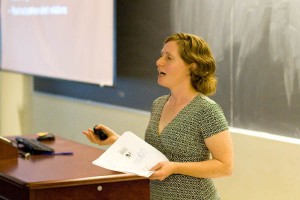
By Elizabeth Carbone
Correspondent
Students were taken out of their own backyards during the politics forum on Oct. 8 when lack of development and the need for politics reform in Bolivia was the main topic of discussion.
Miriam Shakow, assistant professor of sociology and anthropology at the College, based the forum on her research.
Once believed to be the cause of a lack of democratic values in the Bolivian people, Shakow said political conflict and a lack of development have arisen out of the people’s economic situation.
The chief problem in Bolivia that is preventing development and enabling political conflict is patronage. Patronage is not tied to the democratic values of Bolivians however, as it arises out of the economic situation of the majority of the population.
“Democracy depends on economic justice,” Shakow said.
According to Shakow, patronage is the act of buying votes from a population with favors and secret deals, a practice that even the U.S. is no stranger to.
Most of Bolivia’s population self-identifies as indigenous, but this majority has been kept away from wealth and power. Patronage has become essential to obtaining resources, and resources mean a dramatic rise in the standard of living for the poor majority.
Shakow said Evo Morales won the presidency in 2005 as a member of the MAS Party, becoming the first Bolivian president to self-identify as indigenous.
Despite Morales having a platform that advocated demolishing corruption and patronage, patronage continues as a practice.
Shakow said while people condemn patronage and want change, they also are in need of a job and and want upward class mobility. Patronage then becomes necessary. This is a practice that is likely to continue until the economic need of the majority of the population is met, she said.
“Values are inseparable from economic needs, values alone do not drive democracy … when there are vast disparities in wealth and power, there is no way to make democratic structures follow through,” Shakow said.
Steven Elliott, a senior history major who attended the forum, agreed.
“People will always worry more about what’s in their wallet than their political ideals if they are forced to choose … you can agree with someone and their platform but that doesn’t matter if you’re out of work and starving,” he said.
Shakow graduated from Swarthmore College in 1997 and holds advance degrees in anthropology from Harvard University.






